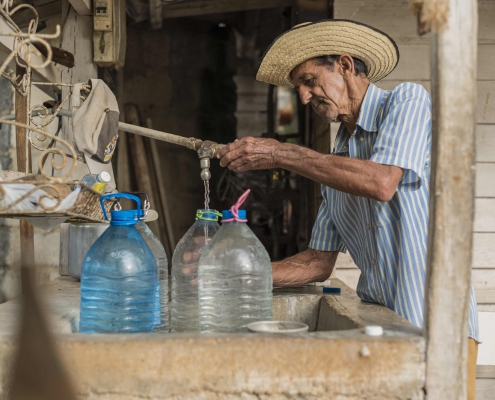Support was strengthened to ensure that the water and sanitation services put in place continue to function, thus guaranteeing supply as much as possible, especially in vulnerable and rural areas.
2020 will be remembered for many years to come as the year of the COVID-19 pandemic. The whole world was hit hard by the virus and it posed a global challenge in the face of which cooperation has been a fundamental, after it was demonstrated that the coronavirus knows no borders. The health, social and economic impact was greater in countries with fewer resources and in those with weaker health systems, as is understandable. Social distancing, along with water and soap, became one of the main ways of protecting against the disease, in a world where one in six hospitals still has no hand-washing facilities.
In these extraordinary circumstances, Spanish Cooperation strengthened the humanitarian response and the Water Fund programmes were adapted to the circumstances by redirecting funds and strengthening mainly the following lines of work:
:
More information

In addition to this reorientation, five new water and sanitation programmes were approved during 2020 for almost €6 million in Honduras, Guatemala, El Salvador, Dominican Republic and Ecuador, to improve water and sanitation services to provide a barrier against the pandemic and improve rural communities’ resilience in the face of new emergencies.
In addition, within the framework of the LAIF Regional programme of delegated cooperation, three new grants were approved for a total amount of around 500,000 euros in El Salvador and Ecuador, aimed at alleviating the effects of the health and economic crisis in vulnerable rural communities.
In addition, the European Union’s confidence in Spanish Cooperation was reinforced, particularly in the area of water and sanitation, with the signing of two new contribution agreements in Portoviejo and Bolivia, for a total amount of €25 million, bringing the total amount of delegated funds managed by the FCAS to almost €130 million.
Partnerships continue to be one of the strengths of the Water Fund, strengthened by the internationally respected Spanish organisations and companies in the sector.
In 2020, Spain joined the Water and Sanitation for All (SWA) initiative, which aims to prioritise the water policy agenda. In addition, collaboration agreements were signed with the public water company of Seville, EMASESA, which will work with water operators on some programmes, as well as with the University of A Coruña, to provide support in Bolivia. During the year, the Spanish Agency for Cooperation joined the Latin American and Caribbean Water and Sanitation Observatory (OLAS). The Observatory was created in response to the need for a tool to monitor Goal 6 of the Sustainable Development Goals (SDGs).
In 2021, a year in which, unfortunately, the pandemic will continue to affect partner countries, it is hoped to be able to continue the commitment to water governance and develop new multi-donor operations, strengthening and promoting new partnerships, as set out in development goal 17 of the 2030 Agenda.

